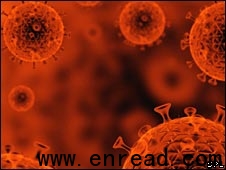| ||||||||||||||||||||||||||||||||||||||||||||||||||||||||||||||||||||||||
|
Two powerful new antibodies to HIV have been found which could aid development of a vaccine1, researchers say. 研究人员称,两种强有力的艾滋病病毒抗体已经被发现,这将会促进疫苗的研究。  Developing an HIV vaccine has proved difficult Researchers, led by the International Aids Vaccine Initiative (IAVI), say the discovery reveals a potential new Achilles heel in the virus's defences. The antibodies are the first of their type to be identified in more than a decade, and the first to be isolated2 from donors3 in developing countries. Details of the breakthrough feature in the journal Science. The researchers hope it could lead to more similar antibodies being found, which in turn could aid the hunt for an effective HIV vaccine. Wayne Koff, of the IAVI, said: "The findings themselves are an exciting advance toward the goal of an effective Aids vaccine because now we've got a new, potentially better target on HIV to focus our efforts for vaccine design. "And having identified this one, we're set up to find more, which should further accelerate global efforts in Aids vaccine development." The new antibodies - broadly neutralising antibodies - are produced by a minority of people with HIV. They are distinct from(与……有差别) other antibodies to HIV because they neutralise(中和) a high percentage of the many types of HIV in circulation worldwide. It is widely believed that to prevent HIV infection a vaccine would need to teach the body to produce these powerful antibodies before exposure to the virus. Animal experiments suggest that conceptually such a vaccine would work. Before this finding only four antibodies to HIV had been discovered that were widely agreed to be broadly neutralising. However, all four worked by binding5 to a place on HIV that has proven difficult for vaccine-makers to exploit. Accessible target The latest duo are potentially much more useful because they bind4 to the virus at sites which scientists believe are more accessible. In theory that should make it easier to produce a vaccine which could stimulate6 the body to start producing these key antibodies. And because the antibodies are very powerful they would not have to be produced in very large quantities to confer protection. The two new antibodies target one of the proteins that form a spike7 used by HIV to infect cells. These proteins are highly-variable and thus difficult for the immune system to attack. But the new antibodies target an area of one protein that does not change. Keith Alcorn, of the HIV information service NAM, said: "Identifying antibodies that act against a broad range of HIV types will be critical for the development of an effective vaccine. "We need to remember that this is an early stage of research. "HIV vaccine research will be a long-term effort and we certainly shouldn't expect these findings to lead to a vaccine in a few years. "A lot more work on antibodies and vaccine design is going to be needed to come up with vaccines8 that can be put into clinical trials." The IAVI team joined forces with the Scripps Research Institute, and the biotechnology companies Theraclone Sciences and Monogram9 Biosciences on the project. 点击  收听单词发音 收听单词发音
|
||||||||||||||||||||||||||||||||||||||||||||||||||||||||||||||||||||||||
- 发表评论
-
- 最新评论 进入详细评论页>>



